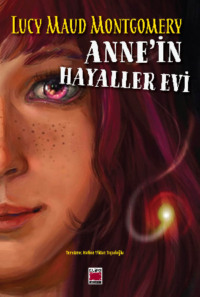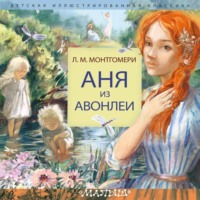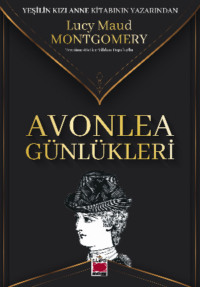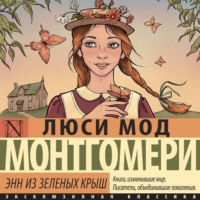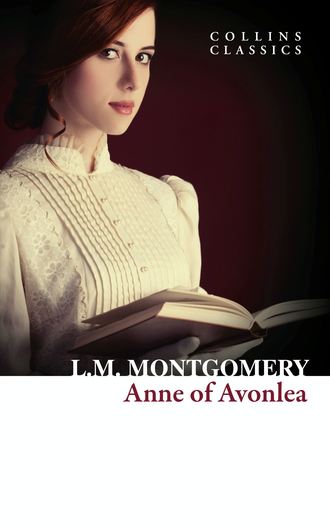
Полная версия
Anne of Avonlea
“My fence is all right,” snapped Mr. Harrison, angrier than ever at this carrying of the war into the enemy’s country. “The jail fence couldn’t keep a demon of a cow like that out. And I can tell you, you redheaded snippet, that if the cow is yours, as you say, you’d be better employed in watching her out of other people’s grain than in sitting round reading yellow-covered novels,” … with a scathing glance at the innocent tan-colored Virgil by Anne’s feet.
Something at that moment was red besides Anne’s hair … which had always been a tender point with her.
“I’d rather have red hair than none at all, except a little fringe round my ears,” she flashed.
The shot told, for Mr. Harrison was really very sensitive about his bald head. His anger choked him up again and he could only glare speechlessly at Anne, who recovered her temper and followed up her advantage.
“I can make allowance for you, Mr. Harrison, because I have an imagination. I can easily imagine how very trying it must be to find a cow in your oats and I shall not cherish any hard feelings against you for the things you’ve said. I promise you that Dolly shall never break into your oats again. I give you my word of honor on that point.”
“Well, mind you she doesn’t,” muttered Mr. Harrison in a somewhat subdued tone; but he stamped off angrily enough and Anne heard him growling to himself until he was out of earshot.
Grievously disturbed in mind, Anne marched across the yard and shut the naughty Jersey up in the milking pen.
“She can’t possibly get out of that unless she tears the fence down,” she reflected. “She looks pretty quiet now. I daresay she has sickened herself on those oats. I wish I’d sold her to Mr. Shearer when he wanted her last week, but I thought it was just as well to wait until we had the auction of the stock and let them all go together. I believe it is true about Mr. Harrison being a crank. Certainly there’s nothing of the kindred spirit about him.”
Anne had always a weather eye open for kindred spirits.
Marilla Cuthbert was driving into the yard as Anne returned from the house, and the latter flew to get tea ready. They discussed the matter at the tea table.
“I’ll be glad when the auction is over,” said Marilla. “It is too much responsibility having so much stock about the place and nobody but that unreliable Martin to look after them. He has never come back yet and he promised that he would certainly be back last night if I’d give him the day off to go to his aunt’s funeral. I don’t know how many aunts he has got, I am sure. That’s the fourth that’s died since he hired here a year ago. I’ll be more than thankful when the crop is in and Mr. Barry takes over the farm. We’ll have to keep Dolly shut up in the pen till Martin comes, for she must be put in the back pasture and the fences there have to be fixed. I declare, it is a world of trouble, as Rachel says. Here’s poor Mary Keith dying and what is to become of those two children of hers is more than I know. She has a brother in British Columbia and she has written to him about them, but she hasn’t heard from him yet.”
“What are the children like? How old are they?”
“Six past … they’re twins.”
“Oh, I’ve always been especially interested in twins ever since Mrs. Hammond had so many,” said Anne eagerly. “Are they pretty?”
“Goodness, you couldn’t tell … they were too dirty. Davy had been out making mud pies and Dora went out to call him in. Davy pushed her headfirst into the biggest pie and then, because she cried, he got into it himself and wallowed in it to show her it was nothing to cry about. Mary said Dora was really a very good child but that Davy was full of mischief. He has never had any bringing up you might say. His father died when he was a baby and Mary has been sick almost ever since.”
“I’m always sorry for children that have no bringing up,” said Anne soberly. “You know I hadn’t any till you took me in hand. I hope their uncle will look after them. Just what relation is Mrs. Keith to you?”
“Mary? None in the world. It was her husband … he was our third cousin. There’s Mrs. Lynde coming through the yard. I thought she’d be up to hear about Mary.”
“Don’t tell her about Mr. Harrison and the cow,” implored Anne.
Marilla promised; but the promise was quite unnecessary, for Mrs. Lynde was no sooner fairly seated than she said,
“I saw Mr. Harrison chasing your Jersey out of his oats today when I was coming home from Carmody. I thought he looked pretty mad. Did he make much of a rumpus?”
Anne and Marilla furtively exchanged amused smiles. Few things in Avonlea ever escaped Mrs. Lynde. It was only that morning Anne had said,
“If you went to your own room at midnight, locked the door, pulled down the blind, and sneezed, Mrs. Lynde would ask you the next day how your cold was!”
“I believe he did,” admitted Marilla. “I was away. He gave Anne a piece of his mind.”
“I think he is a very disagreeable man,” said Anne, with a resentful toss of her ruddy head.
“You never said a truer word,” said Mrs. Rachel solemnly. “I knew there’d be trouble when Robert Bell sold his place to a New Brunswick man, that’s what. I don’t know what Avonlea is coming to, with so many strange people rushing into it. It’ll soon not be safe to go to sleep in our beds.”
“Why, what other strangers are coming in?” asked Marilla.
“Haven’t you heard? Well, there’s a family of Donnells, for one thing. They’ve rented Peter Sloane’s old house. Peter has hired the man to run his mill. They belong down east and nobody knows anything about them. Then that shiftless Timothy Cotton family are going to move up from White Sands and they’ll simply be a burden on the public. He is in consumption … when he isn’t stealing … and his wife is a slack-twisted creature that can’t turn her hand to a thing. She washes her dishes sitting down. Mrs. George Pye has taken her husband’s orphan nephew, Anthony Pye. He’ll be going to school to you, Anne, so you may expect trouble, that’s what. And you’ll have another strange pupil, too. Paul Irving is coming from the States to live with his grandmother. You remember his father, Marilla … Stephen Irving, him that jilted Lavendar Lewis over at Grafton?”
“I don’t think he jilted her. There was a quarrel … I suppose there was blame on both sides.”
“Well, anyway, he didn’t marry her, and she’s been as queer as possible ever since, they say … living all by herself in that little stone house she calls Echo Lodge. Stephen went off to the States and went into business with his uncle and married a Yankee. He’s never been home since, though his mother has been up to see him once or twice. His wife died two years ago and he’s sending the boy home to his mother for a spell. He’s ten years old and I don’t know if he’ll be a very desirable pupil. You can never tell about those Yankees.”
Mrs Lynde looked upon all people who had the misfortune to be born or brought up elsewhere than in Prince Edward Island with a decided can-any-good-thing-come-out-of-Nazareth air. They might be good people, of course; but you were on the safe side in doubting it. She had a special prejudice against “Yankees.” Her husband had been cheated out of ten dollars by an employer for whom he had once worked in Boston and neither angels nor principalities nor powers could have convinced Mrs. Rachel that the whole United States was not responsible for it.
“Avonlea school won’t be the worse for a little new blood,” said Marilla drily, “and if this boy is anything like his father he’ll be all right. Steve Irving was the nicest boy that was ever raised in these parts, though some people did call him proud. I should think Mrs. Irving would be very glad to have the child. She has been very lonesome since her husband died.”
“Oh, the boy may be well enough, but he’ll be different from Avonlea children,” said Mrs. Rachel, as if that clinched the matter. Mrs. Rachel’s opinions concerning any person, place, or thing, were always warranted to wear. “What’s this I hear about your going to start up a Village Improvement Society, Anne?”
“I was just talking it over with some of the girls and boys at the last Debating Club,” said Anne, flushing. “They thought it would be rather nice … and so do Mr. and Mrs. Allan. Lots of villages have them now.”
“Well, you’ll get into no end of hot water if you do. Better leave it alone, Anne, that’s what. People don’t like being improved.”
“Oh, we are not going to try to improve the people. It is Avonlea itself. There are lots of things which might be done to make it prettier. For instance, if we could coax Mr. Levi Boulter to pull down that dreadful old house on his upper farm wouldn’t that be an improvement?”
“It certainly would,” admitted Mrs. Rachel. “That old ruin has been an eyesore to the settlement for years. But if you Improvers can coax Levi Boulter to do anything for the public that he isn’t to be paid for doing, may I be there to see and hear the process, that’s what. I don’t want to discourage you, Anne, for there may be something in your idea, though I suppose you did get it out of some rubbishy Yankee magazine; but you’ll have your hands full with your school and I advise you as a friend not to bother with your improvements, that’s what. But there, I know you’ll go ahead with it if you’ve set your mind on it. You were always one to carry a thing through somehow.”
Something about the firm outlines of Anne’s lips told that Mrs. Rachel was not far astray in this estimate. Anne’s heart was bent on forming the Improvement Society. Gilbert Blythe, who was to teach in White Sands but would always be home from Friday night to Monday morning, was enthusiastic about it; and most of the other folks were willing to go in for anything that meant occasional meetings and consequently some “fun.” As for what the “improvements” were to be, nobody had any very clear idea except Anne and Gilbert. They had talked them over and planned them out until an ideal Avonlea existed in their minds, if nowhere else.
Mrs. Rachel had still another item of news.
“They’ve given the Carmody school to a Priscilla Grant. Didn’t you go to Queen’s with a girl of that name, Anne?”
“Yes, indeed. Priscilla to teach at Carmody! How perfectly lovely!” exclaimed Anne, her gray eyes lighting up until they looked like evening stars, causing Mrs. Lynde to wonder anew if she would ever get it settled to her satisfaction whether Anne Shirley were really a pretty girl or not.
CHAPTER 2
Selling in Haste and Repenting at Leisure
Anne drove over to Carmody on a shopping expedition the next afternoon and took Diana Barry with her. Diana was, of course, a pledged member of the Improvement Society, and the two girls talked about little else all the way to Carmody and back.
“The very first thing we ought to do when we get started is to have that hall painted,” said Diana, as they drove past the Avonlea hall, a rather shabby building set down in a wooded hollow, with spruce trees hooding it about on all sides. “It’s a disgraceful looking place and we must attend to it even before we try to get Mr. Levi Boulder to pull his house down. Father says we’ll never succeed in doing that. Levi Boulter is too mean to spend the time it would take.”
“Perhaps he’ll let the boys take it down if they promise to haul the boards and split them up for him for kindling wood,” said Anne hopefully. “We must do our best and be content to go slowly at first. We can’t expect to improve everything all at once. We’ll have to educate public sentiment first, of course.”
Diana wasn’t exactly sure what educating public sentiment meant; but it sounded fine and she felt rather proud that she was going to belong to a society with such an aim in view.
“I thought of something last night that we could do, Anne. You know that three-cornered piece of ground where the roads from Carmody and Newbridge and White Sands meet? It’s all grown over with young spruce; but wouldn’t it be nice to have them all cleared out, and just leave the two or three birch trees that are on it?”
“Splendid,” agreed Anne gaily. “And have a rustic seat put under the birches. And when spring comes we’ll have a flower-bed made in the middle of it and plant geraniums.”
“Yes; only we’ll have to devise some way of getting old Mrs. Hiram Sloane to keep her cow off the road, or she’ll eat our geraniums up,” laughed Diana. “I begin to see what you mean by educating public sentiment, Anne. There’s the old Boulter house now. Did you ever see such a rookery? And perched right close to the road too. An old house with its windows gone always makes me think of something dead with its eyes picked out.”
“I think an old, deserted house is such a sad sight,” said Anne dreamily. “It always seems to me to be thinking about its past and mourning for its old-time joys. Marilla says that a large family was raised in that old house long ago, and that it was a real pretty place, with a lovely garden and roses climbing all over it. It was full of little children and laughter and songs; and now it is empty, and nothing ever wanders through it but the wind. How lonely and sorrowful it must feel! Perhaps they all come back on moonlit nights … the ghosts of the little children of long ago and the roses and the songs … and for a little while the old house can dream it is young and joyous again.”
Diana shook her head.
“I never imagine things like that about places now, Anne. Don’t you remember how cross mother and Marilla were when we imagined ghosts into the Haunted Wood? To this day I can’t go through that bush comfortably after dark; and if I began imagining such things about the old Boulter house I’d be frightened to pass it too. Besides, those children aren’t dead. They’re all grown up and doing well … and one of them is a butcher. And flowers and songs couldn’t have ghosts anyhow.”
Anne smothered a little sigh. She loved Diana dearly and they had always been good comrades. But she had long ago learned that when she wandered into the realm of fancy she must go alone. The way to it was by an enchanted path where not even her dearest might follow her.
A thunder-shower came up while the girls were at Carmody; it did not last long, however, and the drive home, through lanes where the raindrops sparkled on the boughs and little leafy valleys where the drenched ferns gave out spicy odors, was delightful. But just as they turned into the Cuthbert lane Anne saw something that spoiled the beauty of the landscape for her.
Before them on the right extended Mr. Harrison’s broad, gray-green field of late oats, wet and luxuriant; and there, standing squarely in the middle of it, up to her sleek sides in the lush growth, and blinking at them calmly over the intervening tassels, was a Jersey cow!
Anne dropped the reins and stood up with a tightening of the lips that boded no good to the predatory quadruped. Not a word said she, but she climbed nimbly down over the wheels, and whisked across the fence before Diana understood what had happened.
“Anne, come back,” shrieked the latter, as soon as she found her voice. “You’ll ruin your dress in that wet grain … ruin it. She doesn’t hear me! Well, she’ll never get that cow out by herself. I must go and help her, of course.”
Anne was charging through the grain like a mad thing. Diana hopped briskly down, tied the horse securely to a post, turned the skirt of her pretty gingham dress over her shoulders, mounted the fence, and started in pursuit of her frantic friend. She could run faster than Anne, who was hampered by her clinging and drenched skirt, and soon overtook her. Behind them they left a trail that would break Mr. Harrison’s heart when he should see it.
“Anne, for mercy’s sake, stop,” panted poor Diana. “I’m right out of breath and you are wet to the skin.”
“I must … get … that cow … out … before … Mr. Harrison … sees her,” gasped Anne. “I don’t … care … if I’m … drowned … if we … can … only … do that.”
But the Jersey cow appeared to see no good reason for being hustled out of her luscious browsing ground. No sooner had the two breathless girls got near her than she turned and bolted squarely for the opposite corner of the field.
“Head her off,” screamed Anne. “Run, Diana, run.”
Diana did run. Anne tried to, and the wicked Jersey went around the field as if she were possessed. Privately, Diana thought she was. It was fully ten minutes before they headed her off and drove her through the corner gap into the Cuthbert lane.
There is no denying that Anne was in anything but an angelic temper at that precise moment. Nor did it soothe her in the least to behold a buggy halted just outside the lane, wherein sat Mr. Shearer of Carmody and his son, both of whom wore a broad smile.
“I guess you’d better have sold me that cow when I wanted to buy her last week, Anne,” chuckled Mr. Shearer.
“I’ll sell her to you now, if you want her,” said her flushed and disheveled owner. “You may have her this very minute.”
“Done. I’ll give you twenty for her as I offered before, and Jim here can drive her right over to Carmody. She’ll go to town with the rest of the shipment this evening. Mr. Reed of Brighton wants a Jersey cow.”
Five minutes later Jim Shearer and the Jersey cow were marching up the road, and impulsive Anne was driving along the Green Gables lane with her twenty dollars.
“What will Marilla say?” asked Diana.
“Oh, she won’t care. Dolly was my own cow and it isn’t likely she’d bring more than twenty dollars at the auction. But oh dear, if Mr. Harrison sees that grain he will know she has been in again, and after my giving him my word of honor that I’d never let it happen! Well, it has taught me a lesson not to give my word of honor about cows. A cow that could jump over or break through our milk-pen fence couldn’t be trusted anywhere.”
Marilla had gone down to Mrs. Lynde’s, and when she returned knew all about Dolly’s sale and transfer, for Mrs. Lynde had seen most of the transaction from her window and guessed the rest.
“I suppose it’s just as well she’s gone, though you do do things in a dreadful headlong fashion, Anne. I don’t see how she got out of the pen, though. She must have broken some of the boards off.”
“I didn’t think of looking,” said Anne, “but I’ll go and see now. Martin has never come back yet. Perhaps some more of his aunts have died. I think it’s something like Mr. Peter Sloane and the octogenarians. The other evening Mrs. Sloane was reading a newspaper and she said to Mr. Sloane, ‘I see here that another octogenarian has just died. What is an octogenarian, Peter?’ And Mr. Sloane said he didn’t know, but they must be very sickly creatures, for you never heard tell of them but they were dying. That’s the way with Martin’s aunts.”
“Martin’s just like all the rest of those French,” said Marilla in disgust. “You can’t depend on them for a day.” Marilla was looking over Anne’s Carmody purchases when she heard a shrill shriek in the barnyard. A minute later Anne dashed into the kitchen, wringing her hands.
“Anne Shirley, what’s the matter now?”
“Oh, Marilla, whatever shall I do? This is terrible. And it’s all my fault. Oh, will I ever learn to stop and reflect a little before doing reckless things? Mrs. Lynde always told me I would do something dreadful some day, and now I’ve done it!”
“Anne, you are the most exasperating girl! What is it you’ve done?”
“Sold Mr. Harrison’s Jersey cow … the one he bought from Mr. Bell … to Mr. Shearer! Dolly is out in the milking pen this very minute.”
“Anne Shirley, are you dreaming?”
“I only wish I were. There’s no dream about it, though it’s very like a nightmare. And Mr. Harrison’s cow is in Charlottetown by this time. Oh, Marilla, I thought I’d finished getting into scrapes, and here I am in the very worst one I ever was in in my life. What can I do?”
“Do? There’s nothing to do, child, except go and see Mr. Harrison about it. We can offer him our Jersey in exchange if he doesn’t want to take the money. She is just as good as his.”
“I’m sure he’ll be awfully cross and disagreeable about it, though,” moaned Anne.
“I daresay he will. He seems to be an irritable sort of a man. I’ll go and explain to him if you like.”
“No, indeed, I’m not as mean as that,” exclaimed Anne. “This is all my fault and I’m certainly not going to let you take my punishment. I’ll go myself and I’ll go at once. The sooner it’s over the better, for it will be terribly humiliating.”
Poor Anne got her hat and her twenty dollars and was passing out when she happened to glance through the open pantry door. On the table reposed a nut cake which she had baked that morning … a particularly toothsome concoction iced with pink icing and adorned with walnuts. Anne had intended it for Friday evening, when the youth of Avonlea were to meet at Green Gables to organize the Improvement Society. But what were they compared to the justly offended Mr. Harrison? Anne thought that cake ought to soften the heart of any man, especially one who had to do his own cooking, and she promptly popped it into a box. She would take it to Mr. Harrison as a peace offering.
“That is, if he gives me a chance to say anything at all,” she thought ruefully, as she climbed the lane fence and started on a short cut across the fields, golden in the light of the dreamy August evening. “I know now just how people feel who are being led to execution.”
CHAPTER 3
Mr. Harrison at Home
Mr. Harrison’s house was an old-fashioned, low-eaved, whitewashed structure, set against a thick spruce grove.
Mr. Harrison himself was sitting on his vineshaded veranda, in his shirt sleeves, enjoying his evening pipe. When he realized who was coming up the path he sprang suddenly to his feet, bolted into the house, and shut the door. This was merely the uncomfortable result of his surprise, mingled with a good deal of shame over his outburst of temper the day before. But it nearly swept the remnant of her courage from Anne’s heart.
“If he’s so cross now what will he be when he hears what I’ve done,” she reflected miserably, as she rapped at the door.
But Mr. Harrison opened it, smiling sheepishly, and invited her to enter in a tone quite mild and friendly, if somewhat nervous. He had laid aside his pipe and donned his coat; he offered Anne a very dusty chair very politely, and her reception would have passed off pleasantly enough if it had not been for the telltale of a parrot who was peering through the bars of his cage with wicked golden eyes. No sooner had Anne seated herself than Ginger exclaimed,
“Bless my soul, what’s that redheaded snippet coming here for?”
It would be hard to say whose face was the redder, Mr. Harrison’s or Anne’s.
“Don’t you mind that parrot,” said Mr. Harrison, casting a furious glance at Ginger. “He’s … he’s always talking nonsense. I got him from my brother who was a sailor. Sailors don’t always use the choicest language, and parrots are very imitative birds.”
“So I should think,” said poor Anne, the remembrance of her errand quelling her resentment. She couldn’t afford to snub Mr. Harrison under the circumstances, that was certain. When you had just sold a man’s Jersey cow offhand, without his knowledge or consent you must not mind if his parrot repeated uncomplimentary things. Nevertheless, the “redheaded snippet” was not quite so meek as she might otherwise have been.
“I’ve come to confess something to you, Mr. Harrison,” she said resolutely. “It’s … it’s about … that Jersey cow.”
“Bless my soul,” exclaimed Mr. Harrison nervously, “has she gone and broken into my oats again? Well, never mind … never mind if she has. It’s no difference … none at all, I … I was too hasty yesterday, that’s a fact. Never mind if she has.”
“Oh, if it were only that,” sighed Anne. “But it’s ten times worse. I don’t …”
“Bless my soul, do you mean to say she’s got into my wheat?”


